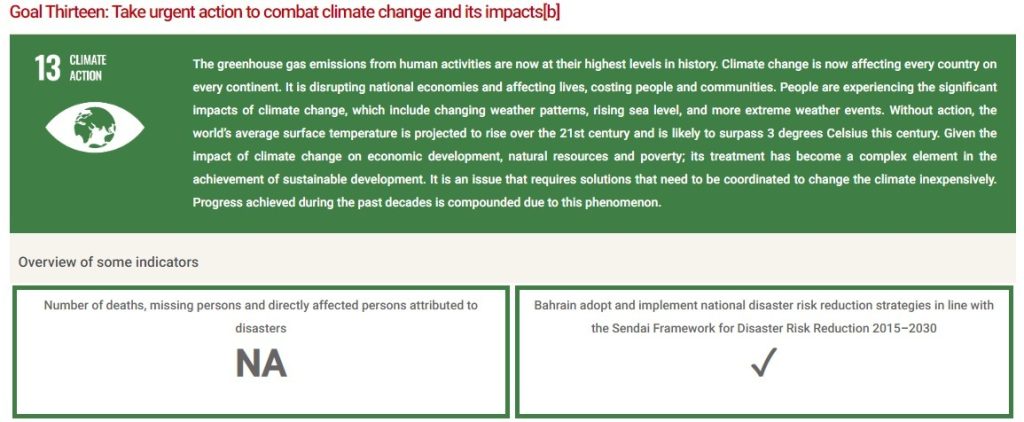SDG 13 - Climate Action
GU recognizes the importance of goal thirteen of sustainable development understanding the significance of combating climate change and its impacts, GU actively engages in efforts to mitigate climate change and promote sustainable practices. It is committed to supporting the Kingdom’s efforts towards achieving SDG 12: Responsible Consumption and Production. The university actively promotes sustainable practices within its campus and community, including beach clean-up initiatives. By organizing events such as waste reduction campaigns, energy efficiency initiatives, and sustainable procurement programs, the university is reducing its environmental footprint and emphasizing the importance of energy conservation and carbon reduction. Additionally, GU encourages students and staff to adopt sustainable lifestyles through educational workshops and awareness campaigns. By promoting a culture of responsible consumption and production, the university is making a significant contribution to the global goal of ensuring sustainable consumption and production patterns.
The “Sustainability Week 2024” organized by Gulf University, Kingdom of Bahrain from the 20th to the 24th of October 2024 was a significant initiative dedicated to promoting sustainable practices aligned with the United Nations’ 17 Sustainable Development Goals (SDGs). Day one was exclusively dedicated to the SDG 13, climate action.
To achieve SDG 13, Climate Action, Gulf University organizes a variety of activities, including workshops, panel discussions, presentations, training sessions, interactive forums, induction events, competitions, and community engagement initiatives. These events feature key speakers and panelists, promoting dialogue and collaboration to drive progress in creating clean environments for the communities. Through these initiatives, the university aims to promote climate change mitigation, adaptation, and awareness, contributing to a more sustainable future.
Bahrain has demonstrated a strong commitment to combating climate change and achieving SDG 13. The country has pledged to achieve net-zero emissions by 2060 and has enacted the Environment Law to protect the environment and conserve natural resources. To address the impacts of climate change, Bahrain has developed a National Adaptation Investment Plan to enhance resilience in vulnerable sectors. Additionally, the country has undertaken a comprehensive study on sea-level rise and developed a Tidal Atlas to inform future planning and adaptation strategies. These initiatives highlight Bahrain’s proactive approach to climate action and its efforts to build a sustainable future. Bahrain understands the significance of taking proactive measures to mitigate climate change and adapt to its impacts. Here are some of the efforts Bahrain has taken in pursuit of SDG 13:
Labour Market Reform
The National Employment Program, launched in 2019, comprised of four key initiatives: launching an awareness campaign to encourage citizens to register, hence improving labour market records, increasing unemployment compensation, increasing expatriate fees, and redesigning Tamkeen’s Training and Wage Support Program. A year later, the National Employment Program 2.0 was launched, offering wage support for Bahraini job seekers and new graduates registered with the Ministry of Labour for a period of up to 36 months. Under the Economic Recovery Plan in 2021, the Government launched initiatives to further empower Bahraini youth and facilitate their entry into the private sector. These measures have successfully led to the employment of 29,995 Bahrainis in 2022, surpassing the annual target of 20,000.The Ministry of Labour continues to explore different innovative ways to train Bahrainis and connect them with employers, including electronic job fairs; the launch of a digital portal for job seekers; the provision of professional training and career guidance; and apprenticeship programs. The Labour Market Regulatory Authority (LMRA) is responsible for regulating expatriate employment with the aim of maintaining an organized labour market that meets the needs of its users, preserves the rights of all its parties, achieves social security, and ensures economic growth. Key protections available to expatriate employees include the establishment of the Wage Protection System, that went into effect in May 2021, which gives the LMRA visibility to monitor the payment of salaries to employees, and the establishment of the ‘Expat Protection Center’, a central hub curated towards providing services to expatriate employees, which includes a legal clinic to provide legal support and assistance in filing cases, passport retrieval services, and a shelter for victims and potential victims of human trafficking.
Tamkeen
Bahrain’s Labour fund, Tamkeen, has a dual mandate of making the private sector the key driver of economic growth and making Bahrainis the employees of choice. On the human development support programs front, Tamkeen prioritizes programs that lead to employment, skills, and career development for Bahrainis. Programs include: the Mid-Career & Executive Leadership program which provides wage subsidies to hire and promote experienced Bahrainis; the Global-Ready Entrepreneur program which covers 70 percent of the cost of participating in reputable overseas structured entrepreneurial programs; and the Train and Grow program, which provides financial support to enterprises to facilitate training and wage increments for their Bahraini employees.
Bahrain efforts for SDG 13

Last Updated on November 27, 2024 @ 03:56:39 pm
